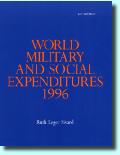Ruth Leger Sivard's |
||
 |
|
Home___Publications___Background___Contact |
|||
| |
||||||
World Military and Social Expenditures by Ruth Sivard |
|
 |
||
In the US, the end of the Cold War should have unleashed our imagination and resources to diversify strategic planning. We should ask what truly threatens our security: emerging dictatorships or discontent within our own borders; rogue states or violence in our streets; crumbling communist countries or our lack of adequate health care. We must examine and debate our military assumptions, assess the way our security is threatened and consider strategies beyond military readiness to prevent and deter conflicts. All countries need such a debate. National Security should be defined broadly, not just as an ability to defend borders. It should also provide conditions for the pursuit of life, liberty and happiness, for the health of the citizens, the education of children, the diversity and sustainability of the economy. Indicators about how well those conditions have been created around the globe are contained in the pages of Ruth Sivard’s report. While much of the responsibility for national security falls on those with the power and resources to affect change, blaming politicians should not be an excuse for citizens to abdicate their own responsibility and with it the power to make change. In 24 years with the Armed Services committee of the US Congress, I have seen the way military policy is made. Decision-making on this subject can lack many things: intellectual leadership, moral courage and careful analysis, among them. The one ingredient that could change everything is an informed, mobilized and focused public prepared to secure the government they deserve. It is a debate that is badly needed. The information laid out in these pages prepares us for it. Patricia Schroeder |
||
Foreword by Patricia Schroeder
During the Cold War, both superpowers used the confrontation to justify their defense build-ups at the expense of their social priorities. While the Cold War’s end produced massive changes in the former Soviet military, changes related also to the collapse of the political economy, it had relatively little effect on the US defense budget, or our social priorities.